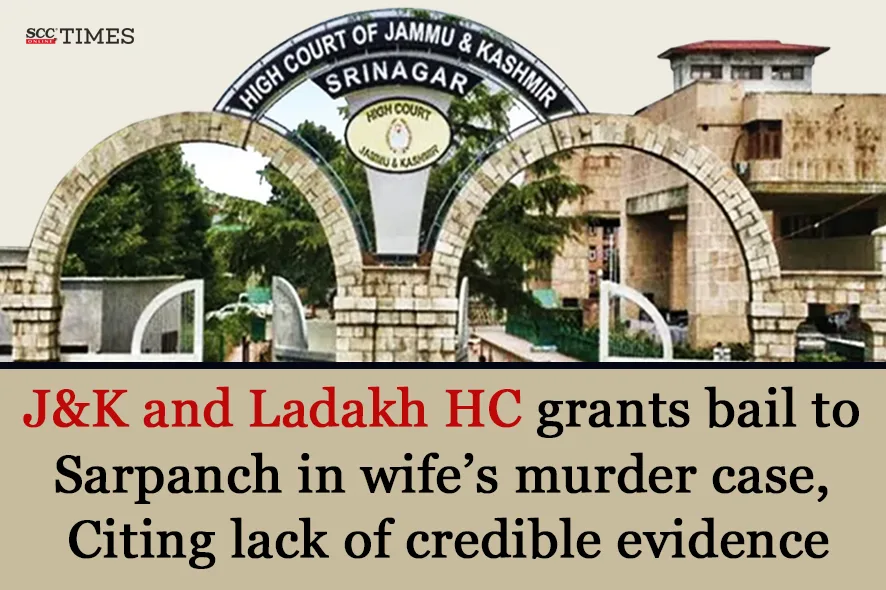Jammu & Kashmir and Ladakh High Court: A bail application was filed by the accused challenging the order of the Principal Sessions Judge (‘Trial Court’), wherein his application for regular bail was declined. He was under trial for the murder of his wife and contended that there was no material evidence in support of the charge. A Single Judge Bench of Rajesh Sekhri, J., held that in cases of ‘no evidence’ the Courts were obliged to take a holistic view of the matter and exercise the discretion of bail and accordingly, granted bail to the accused.
Background:
The accused was the Sarpanch and the member of Village Defence Committee and in that capacity was issued a 303 rifle along with 50 live cartridges. He had a son and a daughter. His son provided DJ services in marriage functions which the accused did not approve of.
The prosecution submitted that on 14-9-2023, the son had a marriage function where he had to play the DJ over which he had a fight with the accused and then he left the house. Then the accused fought with his wife, blaming her for giving free hands to her son and went away. Later, he came home drunk and enquired about his son, to which the wife replied that he had just arrived. The accused got annoyed with his wife and told her that it was because of her that their son was playing DJ, which was not a respectful job. He picked fight with her, took out the VDC rifle, shot at his wife with an intention to kill due to which she received grievous injuries. On hearing the gunshot, the children and few neighbourers arrived and the wife was rushed for treatment. She was then referred to GMC Jammu and during the investigation she succumbed to her injuries.
The police received the information and registered a first information report (‘FIR’) under Section 302 of the Penal Code, 1860 (‘IPC’) read with Section 30 of the Arms Act, 1959. The Investigating Officer (‘IO’) seized the rifle along with two live cartridges, one empty cartridge and one fired bullet.
The accused preferred an application for bail contending that merely because he was charged with the alleged offence, neither in law nor on facts, he could be denied his consideration to admission on bail because the liberty of an individual was a paramount consideration guaranteed under the Constitution. The respondents opposed the bail plea of the accused on the ground of gravity of the charge, severity of the punishment,and pendency of the trial.
Analysis and Decision
The Court emphasised that bail or jail belonged to the blurred area of the criminal justice system which largely hinged on the hunch of the Bench, otherwise called judicial discretion. The Courts should take cognizance of the fact that the liberty of an individual whose involvement was not established in the commission of an offence, should not be lightly dealt with, for deprivation of liberty had an immense impact on his mind and incarceration created a concavity in the personality of an individual.
The Court observed that while a detailed examination of the evidence recorded during trial was to be avoided when considering the question of bail but a brief examination just to be satisfied about the existence or otherwise of a prima facie case was necessary. The Court opined that in cases involving capital punishment or life imprisonment, bail could only be granted if the Court had reasons to believe that the accused had not committed the offence and upon the examination of the material in the present case, the Court found that there was no reasonable ground to believe that the accused was involved in any offence which he had been charged with.
The children of the accused were cited as eyewitnesses but they later stated before the Trial Court that the relations between their parents were quite cordial and reflected their ignorance about the occurrence. Similarly, two police officers, who were witnesses to the seizure, stated that the memo was written by the IO and they merely signed it and thus were unaware of the contents. Another two witnesses also turned hostile.
Thus, noting that there was no substantial evidence available to establish a prima facie case against the accused, the Court allowed the application and granted bail to the accused.
[Yashpaul Sharma v. State (UT of J&K), 2025 SCC OnLine J&K 593, decided on 5-6-2025]
Advocates who appeared in this case:
For the Applicant/Petitioner: P. N. Raina, Sr. Advocate with J. A. Hamal, Advocate.
For the Respondent: Bhannu Jasrotia, GA.



